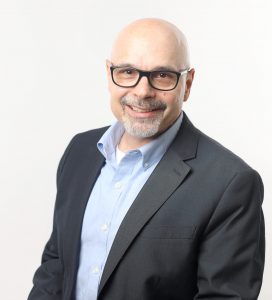Q+A: Psych-Oncology
September 30, 2021 | Tom Wilemon

Michael Radyko, PMHNP-BC, APN, LCSW, leads the Psychology-Oncology Program, which offers mental health support to cancer patients.
Q Is this a new service for cancer patients?
A The psychology-oncology program was launched in September 2020 after some earlier pilot initiatives. It is a joint venture between Vanderbilt Behavioral Health and Vanderbilt-Ingram Cancer Center to support the mental health of cancer patients. We help cancer patients who may be in need of some mental health intervention or support. I provide therapy and medication management consults. We also have a licensed clinical social worker, Jenny Frampton, who offers therapy services. We partner to help meet patients’ needs.
Q Is it available to any patient at Vanderbilt-Ingram?
A It is indeed. We have tried to streamline the process. Basically, the social work team does triage. They perform an oncology behavioral health social worker assessment. For example, if a provider identifies a patient who is having depressive episodes or anxiety to the point where that patient is not functioning very well, the provider will put in a work order for a social worker to do triage. The social worker will talk with the patient and then determine what will work best for that patient, whether that be a referral to our program or to a community provider where the patient lives. We have many folks who come to Vanderbilt-Ingram for treatment who are from out of state.
Q Will insurance providers cover psychology-oncology consultations and services?
A At this point, they are covered predominantly by commercial insurance and Medicare and Medicaid. However, regardless of any questions about insurance coverage, we encourage folks to not let that concern prevent them from seeking care.
Q Isn’t this something every cancer patient might need?
A It would seem that every cancer patient would qualify to be seen. However, there are many patients who already have a great support system. For instance, they may already have a mental health provider they are engaged with. A good criteria check is to look at how folks are functioning in their lives. Are they able to engage in relationships, or are they completely withdrawing and shutting down? Are they still working? Are they able to function at their jobs? Are they getting along with family members? Sometimes, the anxiety from a cancer diagnosis is out of control. I had a patient describe their anxiety as being like bees — like a beehive inside of them.
Q What are the actual treatments and supports offered?
A It may sometimes be just a one-time meeting to set up supports. We may refer patients to support groups like Gilda’s Club or mindfulness and stress counselors at the Osher Center for Integrative Medicine at Vanderbilt. Other patients may need medication and the services of a mental health provider.
Q Describe your collaboration with social worker Jenny Frampton, LCSW.
A I am a licensed clinical social worker and psychiatric mental health nurse practitioner. I’ve been providing psychiatric services as a clinician since 2004. Jenny has worked at Vanderbilt Health One Hundred Oaks for the last 10 years assisting cancer patients, but in this new role she has transitioned from primarily a social worker role to a therapist role. I was not employed by Vanderbilt previously, but I received my Master of Science in Nursing degree from the Vanderbilt University School of Nursing.
Q How can a cancer patient reach out directly for help with mental health?
A The number to call is 615-936-3555 for Vanderbilt Behavioral Health.
